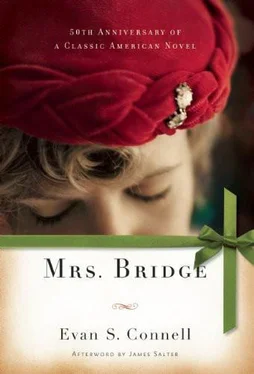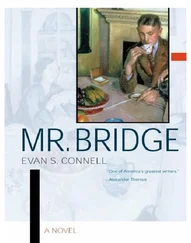The friends of Mrs. Bridge were avid for information about Carolyn’s engagement.
“Is her ring a blue or a white?”
“It’s a lovely opal/’ Mrs. Bridge replied, facing the inquiries with her best smile.
“What a nice idea!”
“It’s what Carolyn was hoping for,” Mrs. Bridge countered.
“I understand he’s not a Kansas Citian.”
“From Parallel,” she replied serenely, and scored a point by not explaining where Parallel could be found.
“It sounds quite far.”
“They’ll be driving up for visits, I’m sure.”
“What does the father do?”
He was a plumber. Mrs. Bridge had confronted herself with this fact a thousand times; there was simply no way around it. She imagined herself replying to this question, which, inevitably, would be asked, replying evasively that he was associated with a company that did household installation, and yet she knew in her heart she must speak the truth. It seemed to her that Carolyn’s happiness depended on the acknowledgment of this condition, and, for better or worse, the acceptance of it.
Said Mrs. Bridge and her throat was so constricted she was afraid the words would lodge there “Mr. Davis is a plumber.” She was astonished to see she had very nearly scored again, for she had spoken with such ease that one might almost believe everybody nowadays was marrying the sons of plumbers.
“I hear the boy is a Beta.”
“Well, no. As I understand the situation, Gil is of the opinion fraternity life can be a liability.”
“Oh, how true,”
“And how does he stand with the draft?”
His feet were as flat as ironing boards and his teeth were bad; he had been rejected as generally unsatisfactory. There was no sense going into detail, such details as Carolyn had given, and so she replied that he had been exempted for medical reasons. She believed he had had rheumatic fever when he was a child. In any event this sounded plausible, and was acceptable.
“You say he’s in Parallel now?
Mrs. Bridge knew what was next. She nodded.
“I see. I didn’t realize he’d already graduated/*
“According to what Carolyn tells me, in his opinion a four-year university education is actually less worth while than a certain amount of practical experience/’ It had been badly put, she knew, and it was a retreat, but the business of the plumber had broken her composure.
106. Present from Douglas
Wedding gifts arrived. Day after day they arrived and Carolyn received enough silver to open a shop. She tore open the packages greedily and her blue eyes gleamed more brightly than the richest plate. Mrs. Bridge, meanwhile, seated at her writing table with a notebook and fountain pen, dutifully jotted down what it was and who had sent it. Carolyn would be expected to memorize this list in order to be able to thank everyone personally and specifically: she would be expected to, but would she? Mrs. Bridge was uneasy. She, herself, no matter how long it took, no matter how arduous the job, would have learned to identify every gift. She could only hope Carolyn would be as considerate.
There were a few awkward presents a green bronze frog to be used as a doorstop, a queer desk lamp that resembled a pagoda, two or three novels and a book of Persian poetry, and from cousin Lulubelle Watts in Memphis a lifetime subscription to a magazine no one had ever heard of. There was one gift, however, worse than these. It was a present from Douglas. It was a toaster.
Douglas had delayed until the last moment because he hated to give or to receive presents. He liked his sister but he did not see where spending fifteen or twenty dollars would prove he wished her happiness. In deference to custom, however, on the next to last day he decided to buy a toaster because she had said she would need one. He walked to the Plaza “Nobody’s using the Lincoln/’ she had said, but he replied that he felt like walking and on the Plaza he looked them over, hands in his pockets, while a salesman demonstrated. He was shown the most elaborate toasters that money could buy, but he was not pleased. The dials were set, the pointers turned, the levers pressed, the machine plugged in, the concealed tray that collected crumbs was removed, all for his benefit, but he was not pleased. At the conclusion of the demonstration he walked across the street to a dime store and bought a primitive toaster such as his parents had had when they were first married.
No one criticized the gift. Carolyn thanked him. Mrs. Bridge exclaimed over how simple it was to operate, and in-deed it was simple. Neither of them mentioned the four magnificent automatic toasters which had been delivered that same morning.
Of course the amount of money spent was not the important thing, everyone admitted that, and everyone said something really should be done to make wedding gifts more reasonable; all the same, people would want to know what Douglas had given his sister, and either Mrs. Bridge or Carolyn would be obliged to point it out. Clearly it had not cost more than two dollars. Mrs. Bridge was absolutely baffled by her son. Never in her life had she so wanted to shake him.
To southern Kansas Carolyn moved after the ceremony and a one-week honeymoon at Excelsior Springs. Mr. Bridge had offered them a wedding trip to the Bahamas, but Gil refused, saying they would honeymoon on the money he himself had earned, so Excelsior Springs was the extent of it. Carolyn had wanted to see the Bahamas ever since she could remember. The wedding gift metamorphosed into one hundred shares of expensive, conservative stock.
Gil began working nights in order to convince his uncle that it was feasible to retire and leave the dry-goods business in his hands, the result being that Carolyn was lonely and bored, and became petulant, and frequently drove to Kansas City for the night after leaving a note pinned to the tablecloth. She would stay in her old room and, if there chanced to be a party that week end, she might remain in Kansas City until Monday. From the beginning she disliked Parallel and could not make up her mind whether she could stand living there.
“The golf course is pathetic, Mother/* she said one evening, a nine-hole public course and by public I mean anybody, but anybody, even if they never saw a golf club before, can play there. I mean, really, how does Gil expect me to accomplish anything there? It’ll absolutely ruin my game. The greens there aren’t any greens, Mother, they’re as hard as wood and the grass is burnt to a crisp. It isn’t any fun. Anybody can hit the ball three hundred yards, just about they just go on rolling. My God! I mean, actually, Mother, you should see that place! I had no idea it would be like that.”
Mrs. Bridge was extremely anxious for Carolyn to be happy. “I should think it would be nice for a change,” she said.
Carolyn was not listening.
“Gil’s a type, really. He is. He’s a small-town boy, and it shows, Mother. He got simply furious when I tried to tell the barber how to cut his hair. I got so mad I wouldn’t speak to him for three days.”
“Dear, I wish you wouldn’t argue with him.”
“Listen, Mother, no man is ever going to push me around the way Daddy pushes you around.”
Subsequent events proved that Carolyn and her husband had their reconciliations, no matter how brief, for she very soon was pregnant.
She drove up from Parallel one snowy afternoon and said as she came in the door, stamping snow from her galoshes, “You’ll never believe this, Mother, because it’s too perfectly incredible/’ And she said this repeatedly, as if to convince herself it was a dream. It was less than a dream, or more, depending, though she continued to exclaim for about three months, “I mean, this is just insane!”
Читать дальше












